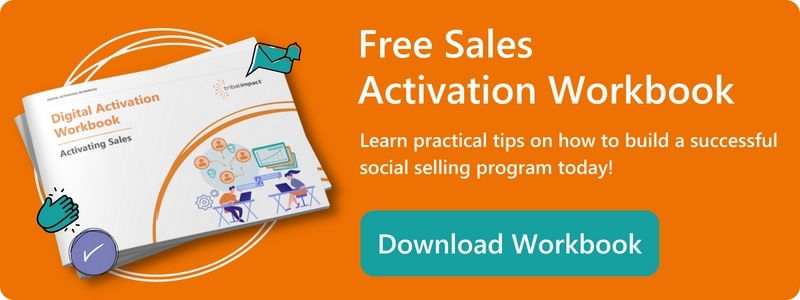%20compressed.jpg?width=660&name=3%20Reasons%20Using%20Agencies%20Or%20Contractors%20To%20Scale%20Social%20Selling%20Isn%E2%80%99t%20The%20Answer%20(3)%20compressed.jpg)
You may be wondering why we’ve just talked ourselves out of work. Surely, we should be persuading you of the benefits of using a social selling agency instead of scaling social selling in-house?
We recently set out the pros and cons of outsourcing vs in-house for social selling programs, with a very balanced view of what works best for your needs.
But as we concluded, while there can be very good reasons to use contractors or an agency within social selling programs, long-term it’s never a good idea. When you’re in the position to scale your social selling, there’s really no other option: your long-term plan should be to do so in-house.
So, we wanted to explore those reasons in more depth. Because what’s a potential business relationship without transparency and honesty?
Check out our chosen Tribal Top 10 Social Selling Reports 2021
(LinkedIn Smart Links)
The 3x Employee Turnover Rate
Sales employee turnover rates are extremely high at 35% - nearly triple that of other roles at 13%. So, within 18 months from now, a third of your sales team are going to be full of different faces. Meaning, if you want your social selling strategy to continue, you will need to ensure any new members are up to speed.
If you have a sales team already reaping the benefits of social selling, then you don’t want a third of that team practising different sales techniques. It therefore makes sense to include this training as part of your onboarding training instead of waiting six months or a year until you have enough new team members to warrant hiring in an external trainer.
Yes, you can deliver eLearning social selling training that gives any new hires an introduction to the topic but blended learning including practical hands-on help is crucial to achieving mastery of any subject.
This can only really be delivered in-house, unless your budget allows you to hire in external social selling trainers every couple of months to ensure any new hires are up-to-speed.
It’s Expensive
The high turnover aside, hiring external social selling trainers can quickly become expensive. Social selling workshops that provide essential practical-based learning typically costs around £5,000 and you will also need to budget for 121 coaching. (Because people will run into difficulties and they will need someone to motivate them to move them through the plateau into long-term social selling success).
So if your plan for scaling social selling relies on hiring an agency or contractors, you’re going to pay £1,000s and £1,000s, year upon year. It’s not sustainable and it’s not cost efficient. And there’s also more you could be doing with your B2B marketing budget!
(And back to the high turnover of sales staff: for every £1,000 you spend on training, you will lose £350.)
Internal Staff Understand Your Business Best
A social selling agency or contractor can be invaluable when running a pilot study (more on that below). That’s when outside perspectives on how best-practices and overcoming roadblocks are most invaluable.
But while an agency should understand your industry and become more akin to a partner, your in-house employees will always have a much better understanding of your industry, sector and key accounts.
Long-term, you want people to deliver training that are social selling savvy AND have role-specific technical knowledge.
So When Should You Outsource Social Selling?
It sounds like we’ve talked ourselves out of work, doesn’t it? Not quite! Many of our clients are now working with us to help them test an initial pilot program and enable their internal social champions through social selling programs such as Coach the Coach and Train the Trainer.
When you’re rolling out a new pilot program, then they can provide you with an ideal framework and help you test and finetune it until it’s ready to roll out to the wider organisation.
An agency can also help on a more consultative basis as you experience fresh challenges on your journey. After all, they’re working with organisations just like yours and those that are one-step ahead (or even those truly ahead of the adoption curve in Unicorn Industries).
That still leaves the problem many organisations face: scaling niche social selling skillsets.
How Do You Build Those Niche Skillsets?
As we explained in this blog, many social selling program managers face the challenge that they need to access niche skillsets but they don’t necessarily need a team of dedicated trainers and coaches to do it. At least, not at first.
This is where what we call “Social Champions” come in. Their sole role isn’t to deliver social media training or coaching but they do it alongside their job. You’ll find them within your marketing team but also amongst your everyday employees who are already active and successful within your employee advocacy program.
It’s Peer-To-Peer Learning.
When you work with contractors or social selling agencies, they should be able to train your Social Champions to confidently and effectively deliver 121 coaching as you scale via a service like Coach the Coach.
As your program scales, you will also need to equip a team of trainers to deliver workshops and webinars. Again, this role may initially take place alongside an existing role and so they may not have the technical knowledge or skills. So, look for Train the Trainer services.
There you have it. We genuinely believe that the future of social selling agencies should lie in enabling an organisation’s internal organisations – being there as a helping hand at the outset and then releasing them to fly successfully. (And welcome them back with open arms if they do run into further challenges.)
One of our core values here at Tribal is Fairness and that involves doing the best by our customers, business and employees. It works best for everyone when we help our customers build long-term business impact – something we build our reputation on.
